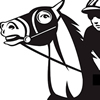Blinkers Off Tall tales from the Derby's past
Last of the Cajun Jockeys

Calvin Borel will be one of two Cajun jockeys riding in the 2012 Derby. (Eclipse Sportswire)
They come to the race track in smaller numbers these days, the Cajun jockeys. Trainer Cecil Borel, theorizes it’s because of the impact of the automobile on the youth of the Bayou and the way it gives them the exit pass all small-town kids crave when the magic of big-city high life beckons.
It is hard to believe that on Saturday when they go to the post for America’s signature race, the Kentucky Derby, there only will be two Cajun riders in the irons — Calvin Borel and Kent Desormeaux.
But what a pair.
Borel has won three of the past four Kentucky Derbies. Desormeaux has won three in his career. The smart money down in the Bayou country is more than happy with this duo. It knows that the “motherland” didn’t raise no bashful jockeys. For further references, just watch the fury with which Borel heads for the rail during any race here all week long.
Among the army of Cajun jocks that came before and for the ones who still ride America’s tracks, big and small, there is a clear legacy that through a blend of genetics, environment and geography was born to ride.

Kent Desormeaux (Eclipse Sportswire)
So what roots spawned these hell-for-leather riders and what is the ethnic road map that brought them to towns with names like Abbeville and Tikotoe and Maurice and Acadiana and started them riding before age 9 at the illegal bush-league tracks where every weekly race day was a party and a wonder?
What spawned these born-to-ride jocks from the bush tracks that disappeared and sent them gravitating to the rebuilt Evangeline Downs, where the betting was legal and the jump to the Fair Grounds in New Orleans or Louisville, New York or California with the big money was just an airplane ride away?
French by birth, American by deportation from Nova Scotia, rejected by the upper-class French in New Orleans, they formed their own culture in the Bayou country of Southwest Louisiana where they took what nature gave them. They farmed, they trapped and they fished. They preserved their unique French patois, their cooking, their values and the horse was king.
This is the fertile soil that fairly grows jockeys.
The names are legendary: Romero, Desormeaux, Borel, Delahoussaye, Albarado, Perret, and that’s just for starters.
All of them rode in match races at age 5, 6 and 7. They would ride five or six quarter horse races a day. The horse was the centerpiece in Cajun country there was always a party before, after and during these illegal point-to-point races, with jambalaya and crawfish and the local sausage cooking in cast iron pots and Cajun barbecue mingled with the sounds of the French accordion music the Cajuns call the “chankachank.”
And while a Zydeco band turns loose its foot-tapping magic, the beat of the frottoir (washboard) and traditional Cajun fiddle calls the young men and the women straight to the dance floor. It is the soul of Cajun life on race days.
Think about a whole Cajun nation of riders who began on quarter horse tracks where 7- and 8- year-old jockeys were prized more for weight than skill, a place where two lovable Bayou bandits set the race conditions like this:
“Weelll, I tink you remember las’ time I pass by your house we make de condition dat I got dat dere boy dere for to ride my bay, but you got to put more weight if you gun run dat roan ‘gainst me.”
Now think Kent Desormeaux, pride of Maurice, La. Desormeaux won his first legitimate race when he was 16 years old at Evangeline Downs. This is a guy who will tell you, “I was in high school, and at night I used to pray that God would make me bigger so I could play basketball. Then, when I started to ride more and win more, I used to pray he’d keep me this size so I could keep riding.”
Listen to Desormeaux’s father, who ran a bush track and watched his kids grow and, at the same time, watched the way it was when it was dying in Cajun Country.
“It was a tradition in the old days,” Desormeaux said. “Before cars, we were so involved with horses and they became our entertainment. Horses were all we had to play with. You know, I can still hear the music at those race parties. There was a song … what was it … ‘and from the background his wife hollers out, ‘Joli Blonde’ (beautiful blonde). You know those tracks were illegal but the Law left us alone. Hey, the Law likes to drink and party, too.”
And if his son or Calvin Borel wins it on Saturday the Bayou will be alive with the down-home chant:
“Laissez les bon temps roulez,” — Let the good times roll.
 Working from Churchill Downs undercover, Blinkers Off is a legendary, award-winning sports writer spinning tall tales from Derbies past. More by
Working from Churchill Downs undercover, Blinkers Off is a legendary, award-winning sports writer spinning tall tales from Derbies past. More by 
